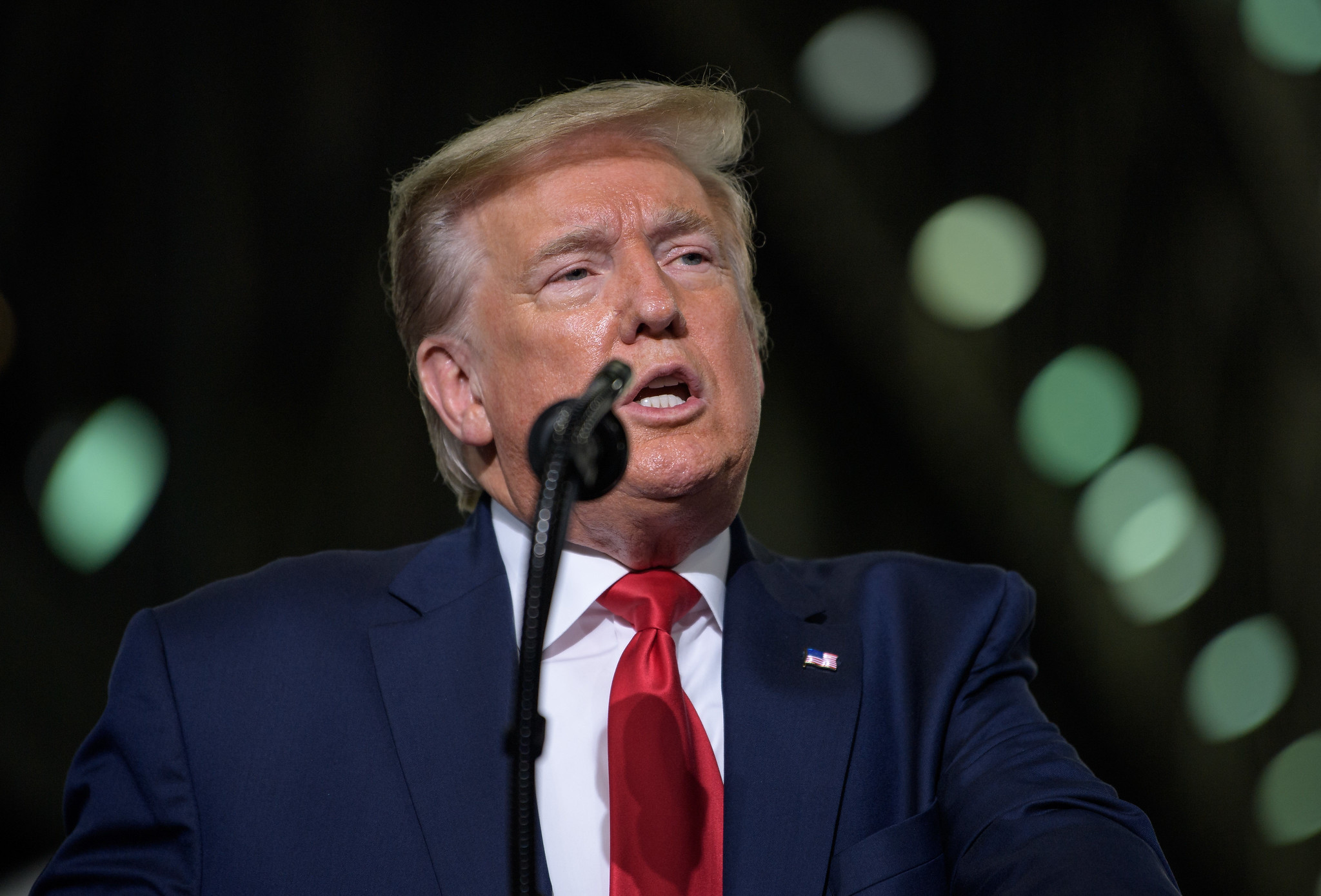Can Trump Order the FDA to Approve a Treatment for Unscientific Reasons?
He cannot do so lawfully, but it’s not clear that any court would act if he tried.

Published by The Lawfare Institute
in Cooperation With

Editor’s Note: Lawfare is not a public health law site, and normally, we would not run a piece on food and drug law and the authority of the FDA. This post, however, involves a matter core to Lawfare’s concerns: the authority of the president to direct the conduct of a federal agency in apparent defiance of clear statutory language.
Over the past several months, President Trump has claimed repeatedly that a novel coronavirus vaccine could be made available before the 2020 presidential election. All along, vaccine experts have thought this timeline very unlikely, and the recent release of information about the design of some of the most promising vaccine candidates confirms that trial results will likely come, at the earliest, later in the fall.
The U.S. Food and Drug Administration (FDA) has expressed openness to a possible Emergency Use Authorization (EUA) for a coronavirus vaccine. The statute permitting EUAs was enacted as part of the Project BioShield Act of 2004 to enable the U.S. Department of Health and Human Services to quickly authorize the distribution of unapproved medical products (including drugs, vaccines and therapeutics) in the event of a public health emergency. The department has long delegated authority to issue EUAs to the FDA. Ensuring that the FDA and Health and Human Services exercise their EUA authority responsibly and free from political interference is critical to ensuring public safety. Consider the current crisis. Any errors in authorizing a treatment or vaccine for the novel coronavirus could have serious repercussions for the United States’s ability to get the pandemic under control, and for health security more broadly. Recognizing the importance of reaching a scientifically sound decision on issuing an EUA for a coronavirus vaccine, the FDA recently set forth in draft guidance the evidence it will require for such a step. When read with the trial designs, it is now almost certain that a vaccine could not be authorized before the election.
In September, Trump castigated the FDA for its approach, and he and his political appointees initially blocked the FDA’s release of its draft guidance. Then, on Oct. 7, two days after the president returned to the White House after being hospitalized with COVID-19, the respiratory disease caused by the novel coronavirus, he tweeted a video message in which he acknowledged receiving Regeneron’s experimental antibody cocktail. He then suggested that he has already personally intervened, or might do so, in the FDA’s consideration of whether to issue an EUA for the Regeneron therapeutic—which is still the subject of clinical trials—because he “felt good immediately” after taking it and because it “was the key” to his returned health.
The politicization of the race to approve safe vaccines and therapeutics for the novel coronavirus raises significant dangers to the public and serious legal questions. Could the president or the secretary of Health and Human Services legally direct the FDA to issue an EUA based on an unscientific belief in the medical product’s effectiveness, or with an intent to influence an election? The short answer is no. Though Congress granted Health and Human Services broad discretion to issue EUAs, it also established clear standards, requiring that emergency authorizations be issued only on the basis of “scientific evidence” and for the purpose of protecting public health. A decision by the president or the secretary of Health and Human Services to issue an EUA on the basis of unscientific claims, or for a different reason, would exceed their authority, and would be illegal and illegitimate.
The enforcement of these standards will, however, likely rely in the first instance on FDA officials and scientists themselves. While there are avenues that could theoretically allow courts to invalidate a political or unscientific grant of an EUA, there is little case law to rely upon. Litigation likely offers a plausible remedy only in cases where the improper nature of the grant is quite obvious. The first line of defense, in all probability, is that the secretary and all federal employees at the FDA have sworn an oath to uphold the Constitution. To fulfill that oath, and to protect the public trust and the agency’s reputation, they must insist that all authorizations or approvals of vaccines or therapeutics follow the scientific, public-health-justified process set forth by Congress.
Legal Standards
Under ordinary circumstances, a manufacturer seeking FDA approval of a vaccine or therapeutic would need to disclose the product’s contents to the agency and demonstrate its safety and efficacy with data from three increasingly rigorous stages of clinical trials, which are generally conducted over the course of several years. Even then, the FDA might approve a product only on the condition that it undergo postapproval studies to learn of potential risks or benefits not discovered during earlier trials.
Congress has also provided Health and Human Services with authority to issue EUAs for vaccines and therapeutics in extreme public health emergencies. The issuance of an EUA allows a manufacturer to begin distributing its product immediately, though the decision is not a full approval, and it also can be conditioned on the completion of further studies. But even in public health emergencies, Congress did not grant the department unbounded discretion to issue EUAs. Instead, Congress set statutory conditions that must be satisfied before the department is empowered to issue an EUA. Two such conditions are relevant here.
First, the secretary of Health and Human Services must “make a declaration that the circumstances exist justifying an [emergency] authorization ... on the basis of” a determination by the secretary that there is an emergency threat to public health. Secretary Alex Azar has previously and appropriately determined that novel coronavirus infections constitute a public health emergency under the Public Health Service Act.
Second, the secretary may then issue an EUA “only if” the secretary concludes that “based on the totality of the scientific evidence available” about the product, “it is reasonable to believe” that it “may be effective in diagnosing, treating, or preventing” the given “serious or life-threatening disease or condition,” and that when used for this purpose, the “known and potential benefits of the product ... outweigh [its] known and potential risks.” The secretary must also find there is no other “adequate, approved, and available” alternative to the product.
The secretary of Health and Human Services has long delegated authority to make the second determination to the FDA commissioner. The current delegation, however, purports to reserve to the secretary the ability to revoke or redelegate authority, unless specifically prohibited.
While the secretary’s discretion to issue an EUA is broad, Congress’s decision to lay out the specific criteria that must be met in order to issue an EUA preclude Azar and Trump from directing that an EUA be issued because of Trump’s belief in its effectiveness or for political reasons. Under the expressio unius canon, a fundamental doctrine of statutory interpretation, the expression of items in a list excludes those items not listed. The Supreme Court has noted that this canon applies where “circumstances support[] a sensible inference that the term left out must have been meant to be excluded.” Here, Congress specified that the government may issue an EUA for a vaccine or therapeutic “only if” the secretary of Health and Human Services determines the product is both effective and net-beneficial in treating or preventing the disease, based on the totality of the “scientific evidence.” These determinations are necessary and essential. A hunch, or a personal experience, or the wish to benefit politically from an approval are not “scientific” evidence and, therefore, may not be weighed by the secretary or president in making an EUA determination. Any EUA decision driven by such considerations would necessarily exceed the secretary’s authority and lack the force of law.
Enforcing the Standards
The EUA statute’s prohibition on unscientific or politically motivated EUAs is relatively straightforward. But the question of who can enforce Congress’s will, and protect the underlying constitutional order when a president ignores Congress’s design, is complicated.
The first line of defense here is not the courts. Federal law requires civil servants to swear allegiance to the Constitution, and insulates lower-level federal employees from being punished for “refusing to obey an order that would require [them] to violate a law, rule, or regulation.” Together, these provisions require public health officials to abide by the limits of the EUA statute and protect them from retaliation for refusing a directive to violate the statute.
While enforcement of Congress’s will should rest with Azar, who is statutorily required to insist on sufficient evidence and an orderly scientific process, it could well fall to lower-level civil servants at Health and Human Services and the FDA to blow the whistle on the issuance of an unscientific or politically motivated EUA. Within the FDA, and Health and Human Services more broadly, there are many career civil servants and experts committed to evidence-based processes for guaranteeing the safety and efficacy of medical products. Reports indicate that FDA Commissioner Stephen Hahn pushed to ensure that the FDA’s guidance laying out heightened standards for issuing an EUA for a coronavirus vaccine was issued over the White House’s initial objection, and eight former FDA directors recently took the unusual step of publishing an op-ed insisting that the agency would follow the science. At least one Health and Human Services official concerned with Trump’s undue pressure to issue emergency authorization for dubious medical products has already engaged the federal whistleblower channels and protections designed for those reporting instances of official wrongdoing. Likewise, Peter Marks, director of the FDA’s Center for Biologics Evaluation and Research, has said he would resign to signal the public if an unsafe or ineffective product were granted an EUA.
Judicial review of an EUA determination provides a potential second safeguard. However, those seeking to enforce Congress’s limits on emergency authorizations would need to identify a cause of action and demonstrate that they have standing to sue.
Causes of Action
There are a variety of viable causes of action—or existing legal rights to challenge the agency action—which might apply to an EUA issued for unscientific or political reasons. Of those, the most viable is an ultra vires claim, as Congress’s design commits the question of EUA issuance to agency review.
If the issuance of an EUA is subject to review under the Administrative Procedure Act, a decision to issue an EUA based on the president’s unscientific belief or for political purposes would certainly run afoul of the act’s prohibition on “arbitrary and capricious” agency action. The Supreme Court has stated that an agency decision is “[n]ormally” considered arbitrary and capricious “if the agency ... relied on factors which Congress has not intended it to consider.” In Tummino v. Hamburg, a district court applied that standard to hold a Health and Human Services secretary’s politically motivated decision unlawful. There, the court explained that the decision was arbitrary and capricious because “[t]he motivation for the Secretary’s action was obviously political” and not based on the efficacy and safety requirements established by Congress.
EUA decisions, however, may not be subject to review under the Administrative Procedure Act. The Administrative Procedure Act precludes judicial review where “agency action is committed to agency discretion by law.” The EUA statute, in turn, provides that the Health and Human Services secretary’s “[a]ctions under the authority of” the statute “are committed to agency discretion.” Relying on this language, courts have recently rejected Administrative Procedure Act challenges to the FDA’s decision to revoke an EUA for hydroxychloroquine, holding that the “committed to agency discretion” language in the EUA statute is sufficient to bar review of Administrative Procedure Act claims . The statutory language makes clear that Congress did not wish to enable the adjudication of EUA decisions in court in any case where the suit is based on scientific dispute. Indeed, the hydroxychloroquine case shows the importance of committing scientific questions to the agency, which is in possession of a great deal of expertise, and is often challenged for spurious reasons. The case was brought by an organization that also opposes mask wearing and social distancing, and did not have the benefit of any credible scientific support.
The U.S. Court of Appeals for the D.C. Circuit, however, has suggested that a decision made pursuant to a statute explicitly committing that decision to agency discretion may still be subject to review if the statute provides meaningful standards against which to judge agency action. A well-pleaded allegation that science was not the basis for the FDA’s decision may be plausible under this standard. While the secretary has a great deal of discretion in the EUA scheme, he clearly does not have authority to act on an unscientific basis—and while there is ample room for scientific disagreement, there are also grounds for decisions that would be clearly unscientific. Reliance on evidence of the kind we describe—particularly if the president were to broadcast his intention to act on that basis—could therefore provide grounds for judicial review and, indeed, would be important to Congress’s design.
Even if Administrative Procedure Act review is unavailable, there is an alternative, nonstatutory, cause of action available under which courts could review a challenge to a baseless or politically motivated EUA. Under the ultra vires doctrine, an action taken in excess of an agency’s authority is subject to judicial review. Long before Congress passed the Administrative Procedure Act, and ever since, the Supreme Court has recognized that a government officer who acts beyond statutory limitations “is not doing the business which the sovereign has empowered him to do or he is doing it in a way which the sovereign has forbidden. His actions are ultra vires his authority and therefore may be made the object of specific relief.” Even where a statute on its face appears to preclude judicial review of a discretionary agency action under the Administrative Procedure Act, the Supreme Court has entertained ultra vires claims, or those alleging that an action was plainly taken “in excess of [the agency’s] delegated powers and contrary to a specific prohibition in the Act.”
As the D.C. Circuit has explained, “the [Administrative Procedure Act’s] stricture barring judicial review ... ‘does not repeal the review of ultra vires actions that was recognized long before. When an executive acts ultra vires, courts are normally available to reestablish limits on his authority.’” More recently, in 2019 the U.S. Court of Appeals for the D.C. Circuit adopted a three-part test, holding that ultra vires review is available where “(i) [a] statutory preclusion of review is implied rather than express; (ii) there is no alternative procedure for review of the statutory claim; and (iii) the agency plainly acts in excess of its delegated powers and contrary to a specific prohibition in the statute that is clear and mandatory.” In keeping with the Supreme Court’s intent that ultra vires review be “extremely limited in scope,” this test is appropriately tailored to allow courts to scrutinize only “extreme” agency errors. The high bar for ultra vires review affords agencies ample discretion to exercise congressionally delegated authority, and establishes strict safeguards against vexatious litigation brought and judicial harassment.
Even under the D.C. Circuit’s narrow test, ultra vires review should be available to challenge a politically motivated decision by Azar to issue an EUA, either at Trump’s direction or of his own volition. First, Congress has not explicitly precluded judicial review—at most, it has explicitly prohibited review of Administrative Procedure Act claims. Second, assuming such review is unavailable, ultra vires review is the only available alternative for reviewing a claim that the secretary violated the EUA statute. Third, issuing a scientifically indefensible EUA for transparently political reasons would constitute unauthorized government conduct, in excess of the secretary’s delegated powers. After all, Congress explicitly conditioned the secretary’s authority to issue an EUA on several specific conditions being met; these do not include the president believing the product to be safe and effective, the president directing that an EUA be issued, or an EUA benefiting the president politically.
Standing
The other major obstacle a plaintiff would need to overcome is the threshold constitutional requirement to demonstrate standing. To have Article III standing, plaintiffs must demonstrate that they have “suffered an injury in fact,” that there is a “causal connection between the injury and the conduct complained of,” and that it is “likely, as opposed to merely speculative that the injury will be redressed by a favorable decision.”
Medical product manufacturers likely to lose market share to a competitor receiving an EUA would certainly have standing, because the Supreme Court has consistently held that businesses have standing to “challenge agency action relaxing statutory restrictions on the activities of” their competitors. In addition, individuals whose employers require that they be vaccinated or take a prophylactic drug would also have a strong claim of standing. In several cases, courts have entertained service members’ challenges to the FDA’s approval of vaccines where those service members were subject to mandatory vaccination programs. That could include health care workers in federally funded hospitals, as the federal government sometimes requires health care workers to receive certain vaccines.
Patients, doctors and medical associations could have trouble establishing standing to challenge an unscientific or politically motivated EUA otherwise. Some courts have held that patients and doctors must allege more than the possibility of a future medical injury from FDA-sanctioned products to demonstrate a sufficiently concrete, imminent and personalized injury in fact, and others have rejected standing because alleged harms are attributable to independent decisions by doctors and patients. At least some courts have, however, held that individuals and organizations have standing to challenge the FDA regulations that result in a “credible threat” that they or their members will be exposed to a harmful product.
Assuming Trump does not issue a presidential directive that is facially unlawful (an assumption we do not take for granted) and that any EUA issued is likely to be, at a minimum, gilded with some scientific justification, a difficult question for courts will be when to allow discovery or engage in scrutiny that Congress clearly did not want to invite simply because of a scientific dispute. In the main, we expect courts will rightly reject legal challenges to EUA decisions. But, as in other recent controversies, evidence—including statements by the president—that the government’s stated justification for an EUA is clearly pretextual may provide sufficient basis for such discovery and illuminate facts sufficient to show that a decision was made on an improper basis.
Conclusion
While Congress delegated broad discretion to issue EUAs to the Department of Health and Human Services in public health emergencies, it also established prerequisites that must be met before the secretary of Health and Human Services is empowered to exercise that authority. Specifically, the FDA commissioner, or the Department of Health and Human Services more broadly, may issue an EUA only if the department determines reasonably that the product may be both effective and net-beneficial in treating or preventing a given disease, based on the totality of the scientific evidence. These limitations prohibit the department from issuing EUAs for coronavirus vaccines or therapeutics at the directive of the president or other administration officials based on the president’s unscientific hunches or to garner political support. If Health and Human Services were to issue an EUA it would not otherwise issue, but for its consideration of the president’s belief or political factors, the department would exceed its authority, rendering the decision illegal and illegitimate. Review by the courts is possible in such an extreme case, though not where the agency operates properly within the zone of scientific disagreement. Congress’s statutory design, and the constitutional order, however, makes FDA employees, and the secretary himself, the frontline enforcers of law in this case. Recent signals that FDA officials are committed to scientific assessment before issuing an EUA are thus important and positive steps, and are the most reliable source of the vindication of the public’s rights.
Disclosure: One of the authors works for Protect Democracy, which has represented Lawfare editors Benjamin Wittes, Jack Goldsmith, Scott Anderson and Susan Hennessey on a number of separate matters.







